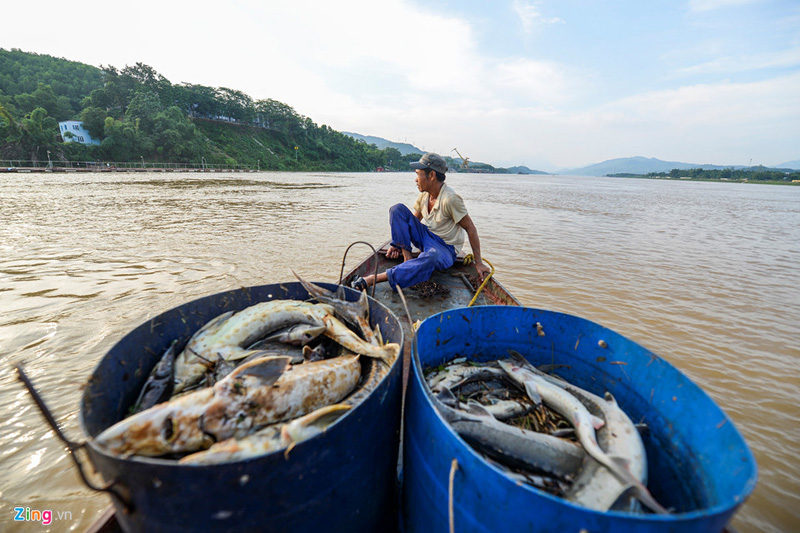
(HBO) – Meeting with pharmacist Do Van Nhuan, listening to his story and looking at how he works, we feel that that he is not only a passionate but also adventurous person when deciding to invest in raising sturgeon in river whirlpools downstream the Hoa Binh hydropower plant.
The sturgeon farm of
Do Van Nhuan’s family creates stable jobs for 10 labourers with an average
income of 6 million VND per person per month.
Most people raising fish in cages choose static water
areas with little wind outside the water flow. On the contrary, Do Van Nhuan
selected the whirlpools to place fish cages. Nhuan shared that "No one has
thought that sturgeon can be raised in Hoa Binh city, especially in the
downstream area of Hoa Binh hydropower plant in Da River. The province had
mapped out a plan to develop coldwater fish in Hien Luong, Dong Nghe, and Suoi
Nanh communes in Da Bac district. Before putting fish cages in the river in Tan
Hoa ward, Hoa Binh city (the old location of the Thia ferry station), I had thoroughly
studied various parameters from summer and winter temperatures to water flow
rates. In October 2015, I started investment as I discovered that in the
whirlpools the water is cleaner with more oxygen, thus making the fish move
around more, resulting in high-quality fish products.
"Following legal regulations to run investment
is the most important matter to ensure stable and long-term production and
business,” Nhuan said, adding that he had the fish cage locations, the origin
of fish fry and food, and environmental protection checked and approved by competent
agencies such as port authorities, waterway traffic inspectors, environmental
police, animal health and fisheries sub-departments. Therefore, all of his 80
fish cages, which had a total area of nearly one hectare of water surface, were
located in positions not blocking the passing of boats on the river. The feed
is checked to ensure it does not contain antibiotics and growth stimulants.
Waste discharged during the process of caring for fish is brought ashore. Dead
fish were collected to make fertilizer. Particularly, Nhuan uses his knowledge
in pharmaceuticals to grow medicinal plants to prevent diseases for fish. He
said "Hoa Binh has many kinds of plants which can be used to make antibiotics
for animals, including fish. By that way, the fish are clean and healthy, thus well-liked
by customers.”
Among the 80 fish cages of Nhuan’s family, except
for some raising Duong Nghiep tilapias, most house sturgeons with 800 fish per
cage. As sturgeon is popular on the market, the fish has become a new choice
for farmers engaging in fish cage raising in Da River. The production and trade
of sturgeons have helped generate jobs for 10 labourers with an average income
of 6 million VND per worker per month. His family’s first products were
introduced at the socio-economic achievement exhibition on the occasion of the
130th founding anniversary of the province, and 25th anniversary of the
provincial re-establishment. The fish were sold on the market (mainly
Hanoi) at the minimum
weight of
3 kilogramper sturgeon and average price of 250,000 VND per kilogram.
In Lac Thuy district, communes have been succeeded in promoting their One Commune-One Product (OCOP) products while others are still struggling to position their typical farming products in market. Some communes in the district still fail to have their products met OCOP programme’s requirements, while others have seen their certifications expired.
The inspectorate agency of Hoa Binh province has issued Official Dispatch No. 1090/TTr-PCTN to provincial departments, agencies, localities, business associations, enterprises, and investors regarding measures to improve informal component indexes of the Provincial Competitiveness Index (PCI).
Hoa Binh is taking concrete steps to improve its investment environment, with a strong focus on supporting businesses, settling obstacles for strategic investors, and creating opportunities for robust development in the coming years.
Under the blazing early summer sun, the construction site of Nhuan Trach Industrial Park (IP) in Luong Son district is abuzz with activities from dawn to dusk, a testament to the determination of the investor to meet their construction targets on schedule.



